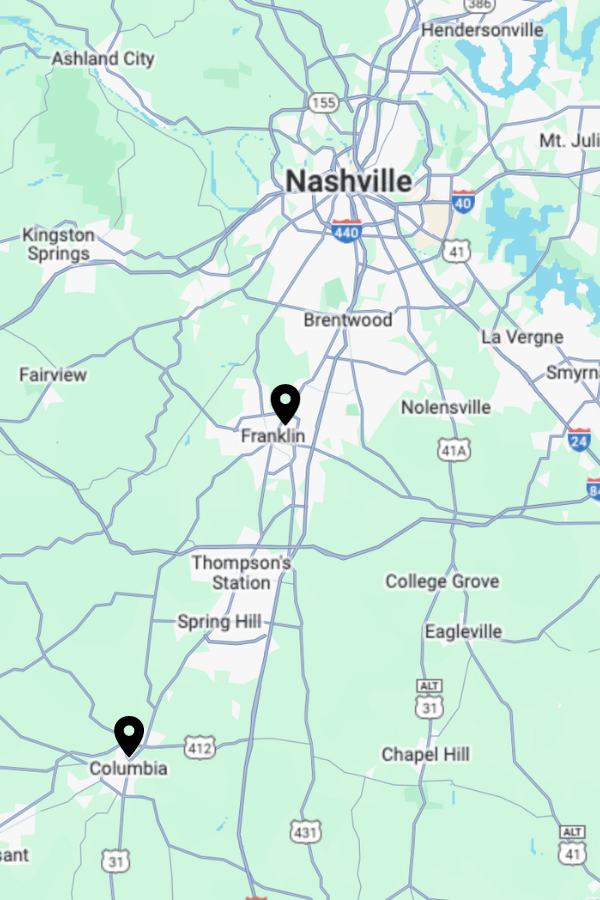Apex Recovery operates several rehabilitation facilities across Tennessee, providing comprehensive support for those battling addiction. With locations strategically situated throughout the state, Apex offers customized drug recovery programs addressing various substance abuse issues. From outpatient services to residential care, each center delivers compassionate treatment, hope, and healing.
At our conveniently located Apex Drug and Alcohol Addiction Recovery Centers, specialized cocaine rehab treatment is available for people facing substance abuse challenges, mental health disorders, and dual diagnosis cases. Our integrated approach combines evidence-based therapies and personalized care to address each person’s unique needs comprehensively. With a focus on holistic healing, we guide clients toward recovery, inspiring long-term well-being and resilience.

Learning About Cocaine Use Disorder (CUD)
Cocaine Use Disorder (CUD) is a chronic condition characterized by compulsive cocaine use. People with CUD may experience intense cravings, withdrawal symptoms, and a loss of control over their drug use. Long-term cocaine abuse can lead to severe health complications, including cardiovascular issues, respiratory problems, and neurological damage.
Treatment for CUD generally involves a combination of therapy, cocaine addiction medication, and support services aimed at addressing both the physical and psychological aspects of addiction. With comprehensive treatment and ongoing support, those with CUD can achieve recovery and lead fulfilling lives free from the grip of cocaine addiction.
What Is Cocaine Chemical Dependency?
Cocaine-induced pleasure is enormous, at least initially. With time, the brain becomes accustomed to the presence of cocaine and cannot produce the feeling of pleasure on its own as sufficiently as it could before cocaine. Those who use cocaine may seek more of this powerful pleasure and keep increasing the doses in pursuit of the initial “high.” The vicious circle inevitably leads to drug addiction, physical dependency, and a life oriented around cocaine acquisition.
Cocaine is a harmful drug, and individuals with a cocaine addiction will need professional help to escape the substance use successfully. Cocaine dependence has long-term effects not only on the body but on a person’s mental health as well.
Free Addiction Assessment
Schedule a free, confidential assessment with a licensed clinician. Apex Recovery can check your insurance coverage levels for drug and alcohol addiction, and mental health treatment.
What is a Cocaine Addiction Treatment Program?
A cocaine addiction treatment program is a structured and comprehensive approach designed to help people overcome their cocaine dependence. These programs typically involve a combination of therapies, counseling, medication, and support services. Treatment may include cocaine detoxification to safely manage withdrawal symptoms, and behavioral therapies such as cognitive-behavioral therapy (CBT) to address underlying psychological factors contributing to addiction.
Additionally, cocaine addiction support groups and aftercare planning are often integral components to help patients maintain sobriety and prevent relapse. By providing a holistic approach to recovery, cocaine addiction treatment programs empower people to regain control of their lives and achieve long-term sobriety.
Statistics on Cocaine Addiction in Middle Tennessee
Historically, cocaine, particularly crack, posed the greatest drug threat to Tennessee, although the rapid rise of fentanyl is changing the landscape. The distribution and abuse of crack are linked to more violent crime than any other drug. Tennessee sees more cocaine-related treatment admissions and federal sentences than any other drug.
In 2018, there were 251 cocaine-related overdose deaths in TN, which escalated to 727 in 2022. Deaths involving cocaine surged more than other stimulants from 2021 to 2022. In 2022, 595 drug overdose deaths involved both cocaine and opioids. Nationally, an estimated 1.5 million people have Cocaine Use Disorder (CUD), with approximately 2.2 million using cocaine regularly. Cocaine use and CUD are on the rise nationwide, with about 20% of cocaine users meeting CUD criteria at some point in their lives.

Can You Tell if Someone is Addicted to Cocaine?
Identifying cocaine addiction can be complex, as people may conceal their substance use or deny having a problem. However, certain signs and symptoms can indicate the presence of a cocaine addiction.
One common indicator is a noticeable change in behavior and mood. Someone addicted to cocaine may exhibit increased secrecy, withdrawal from social activities, and erratic behavior. They may also experience sudden mood swings, ranging from euphoria and heightened energy to agitation and irritability.
Physical manifestations of cocaine addiction can include changes in appearance and health. Individuals may display dilated pupils, frequent nosebleeds, and rapid weight loss due to decreased appetite. Additionally, they may exhibit signs of insomnia or irregular sleep patterns, coupled with extreme fatigue during periods of cocaine use and withdrawal.
Financial difficulties may arise as addiction progresses. People may borrow money frequently, sell personal belongings, or engage in illegal activities to fund their habit. Moreover, neglect of personal and professional obligations, such as work or family responsibilities, can become evident as the addiction consumes more time and energy.
Relationships may suffer due to increased conflict, lies, and broken promises. Isolation from friends and family members who disapprove of drug use may further exacerbate feelings of loneliness and alienation. Additionally, withdrawal symptoms such as depression, anxiety, and intense cravings can occur when cocaine use is discontinued, driving people to continue using the drug to avoid these unpleasant experiences.
Why Choose a Cocaine Rehab Program?
Cocaine is unbelievably addictive, and a person can quickly develop a chemical dependency on the substance. Secondly, cocaine is exceptionally unpredictable. It increases the pulse rate but heightens the blood vessels, which results in higher blood pressure. Cocaine can induce cardiac arrest in users anytime—the first or the five-hundredth use.
Cocaine, like all drugs, rewires the brain, and that’s the root of its addictive nature. However, some brains function in a way that makes them more susceptible to developing addictions. Actually, any addiction or substance use, including cocaine addiction, is 50% genes and 50% inadequate coping skills.
The fact that one-half of addiction recovery is learning coping skills. Apex Recovery Tennessee provides cocaine addiction treatment to improve the client’s ability to effectively manage everyday psychological, social, and emotional problems. Cocaine use is predominantly a way of avoiding issues because the user lacks the skills to tackle them. Durable effects of detox and the cocaine rehab process hinge on psychological therapy.

- Please complete and send the form below.
- One of our staff members will contact your insurer to check your coverage.
- We will contact you promptly with the results and to discuss the next steps.
Insurance Verification
"*" indicates required fields
Locating Addiction Centers That Offer Cocaine Rehab in Tennessee
Apex Addiction Recovery Center in Tennessee provides compassionate and effective local cocaine treatment options. Our dedicated team of professionals offers personalized programs to facilitate cocaine addiction recovery. If you or a loved one is ready to embark on the journey to recovery, call Apex at (877) 881-2689 or contact us online to take the first step toward lasting sobriety and wellness.

Cocaine Treatment Program in Nashville, Tennessee (TN)
With multiple facilities across the state, including Apex Recovery Franklin and Apex Recovery Columbia, you can access comprehensive support close to home.
Apex Recovery Franklin
4601 Carothers Pkwy STE 250A
Franklin, TN 37067
Apex Recovery Columbia
2710 Trotwood Ave STE A & B
Columbia, TN 38401
How to Find an Cocaine Addiction Rehab Facility Near Me
Finding a cocaine addiction rehabilitation facility nearby involves a series of steps to guide you through the process effectively.
- Evaluate Your Needs: Determine if you require inpatient or outpatient care and identify any specific preferences, such as holistic treatments or dual diagnosis cocaine addiction support.
- Utilize Online Resources: Employ search engines using terms like ” cocaine addiction recovery programs near me”, “cocaine addiction recovery near me”, or “Cocaine addiction recovery centers in Tennessee to locate nearby facilities.
- Explore Online Directories: Investigate specialized online directories like SAMHSA or the National Helpline for comprehensive lists of rehab facilities.
- Check Insurance Coverage: Review your health insurance policy to identify in-network facilities and contact your provider for a list of covered rehab centers.
- Confirm Accreditation: Ensure the facility holds accreditation and proper licensing by consulting organizations such as CARF or The Joint Commission.
- Review Testimonials: Research reviews from former patients or their families on platforms such as Google, Yelp, or healthcare review websites.
- Reach Out to Facilities: Contact potential facilities to inquire about their treatment programs, staff qualifications, and available aftercare services.
- Visit the Facility: If feasible, arrange a visit to assess the facility’s environment and meet the staff firsthand.

Learning About the Popular Sites of Middle Tennessee
Nestled in the heart of the Volunteer State, Nashville, renowned as the country music capital, hosts the Grand Ole Opry, where the sounds of legends echo through the halls. In Memphis, the aroma of BBQ wafts through the air, while visitors pay homage to the King of Rock ‘n’ Roll at Graceland, the estate of Elvis Presley.
Knoxville is a gateway to the majestic Smoky Mountains, offering outdoor enthusiasts a playground of hiking trails and scenic vistas. Meanwhile, Dollywood, nestled in the foothills, captivates visitors with its charming blend of Southern hospitality and thrilling attractions.
Our Cocaine Rehab Center in Nashville, Tennessee
Apex Recovery Tennessee’s drug rehab takes an integrative, holistic approach in our residential and outpatient cocaine addiction and cocaine use treatment center. We believe in providing evidence-based treatment options proven to treat cocaine dependence.
Our highly qualified professionals can support individuals through multiple programs that include:
- Individual therapy
- Group and family counseling
- Cognitive-behavioral therapy
- Music therapy
- Nutritional counseling
- Wellness and recreation
- Meditation
- Therapies that focus on sexual issues and sexual identity
Individuals with a cocaine addiction need professional help during rehab. Cocaine addiction can rapidly ruin personal relationships and has far-reaching and long-lasting health consequences. People who use cocaine can be impulsive, which may negatively affect their decision-making skills and willpower when indulging in any opiate. Only with the help of experienced, specialized, and compassionate staff do they have the best odds at conquering their addiction.
Does Health Insurance Cover Cocaine Addiction Rehab in Tennessee?
In Tennessee, health insurance coverage for cocaine addiction rehab varies depending on the individual’s insurance plan and provider. Many insurance plans do offer coverage for substance abuse treatment, including rehab for cocaine addiction. However, the extent of coverage, such as the types of treatment programs covered and any out-of-pocket expenses, can differ widely.
It’s essential for potential patients to review their insurance policy carefully and contact us at Apex Alcohol and Drug Addiction Recovery Center to understand their specific coverage details for addiction treatment services. Additionally, we offer assistance with insurance verification and can check your insurance, navigating the insurance process to help you access the care you need.
What Are the Health Insurance Providers That Offer Coverage for Cocaine Use Disorder Rehab?
Several major health insurance providers offer coverage for rehab services related to Cocaine Use Disorder (CUD) in Tennessee. These include Blue Cross Blue Shield (BCBS), Aetna, Cigna, UnitedHealthcare, and Humana, among others. However, coverage can vary widely depending on the specific plan and policy details.
It’s crucial for you to review your insurance documentation carefully, including the terms of coverage for addiction treatment services. Additionally, contacting the rehab facility – like Apex Substance Addiction Recovery Center – can help clarify the extent of coverage and any potential out-of-pocket expenses associated with seeking treatment for CUD.
How Much Do Cocaine Treatment Programs Cost in Middle Tennessee Without Health Insurance Coverage?
The cost of cocaine treatment programs in Middle Tennessee without health insurance coverage can vary significantly depending on factors such as the type of program, duration of treatment, and amenities provided. Generally, outpatient programs may range from $1,000 to $10,000 or more per month, while residential programs can cost anywhere from $5,000 to $30,000 or more per month.
Detoxification services may incur additional expenses, typically ranging from $500 to $2,000 or more. However, these are rough estimates, and actual costs may differ based on individual needs and the specific facility chosen. It’s a good idea to contact rehab centers directly for accurate pricing information.
Are There Withdrawal Symptoms from Cocaine Use?
While cocaine withdrawal may not produce physical symptoms as severe as those associated with opioids or alcohol, it can still be challenging and uncomfortable for people trying to quit or reduce their cocaine use. Withdrawal from cocaine primarily involves psychological symptoms, which can vary in intensity depending on the person’s dependence and usage patterns. Common cocaine withdrawal symptoms include:
- Fatigue and lethargy: People may experience extreme tiredness and a lack of energy as their body adjusts to the absence of cocaine stimulation.
- Depression and dysphoria: Feelings of sadness, hopelessness, and general dissatisfaction with life are common during cocaine withdrawal.
- Anxiety and agitation: Some individuals may experience heightened anxiety, restlessness, and irritability as their brain chemistry rebalances.
- Increased appetite: Cocaine suppresses appetite, so withdrawal may lead to rebound hunger and increased food intake.
- Vivid dreams or nightmares: Changes in sleep patterns and brain chemistry during cocaine withdrawal can lead to intense and vivid dreams or nightmares.
It’s important to note that the severity and duration of cocaine withdrawal symptoms can vary widely among individuals. Factors such as the frequency and duration of cocaine use, as well as underlying mental health conditions, can influence the intensity of withdrawal symptoms. Additionally, cravings for cocaine may persist long after physical withdrawal symptoms subside, making it challenging for some to maintain abstinence without proper support and treatment.
What Are Different Types of Cocaine Addiction Treatment Medications?
Cocaine addiction treatment medications are prescribed based on individual needs, health conditions, and circumstances. While medications may not directly treat cocaine addiction, they can help manage withdrawal symptoms, reduce cravings, and prevent relapse. Examples include Methadone, Buprenorphine (Suboxone), and Naltrexone.
Methadone is a synthetic opioid agonist that works by binding to the same receptors in the brain as opioids and other drugs like cocaine. It helps to reduce withdrawal symptoms and cravings. Methadone is typically administered orally on a daily basis and is often used in medication-assisted treatment (MAT) programs for cocaine addiction.
Buprenorphine (Suboxone) is a partial opioid agonist that also binds to the same receptors in the brain as opioids and cocaine. It can help reduce cravings and withdrawal symptoms without producing the same intense euphoria as other opioids. Suboxone, a combination medication containing buprenorphine and naloxone, is commonly prescribed for MAT in cocaine addiction treatment. The addition of naloxone helps deter misuse by causing withdrawal symptoms if the medication is injected.
Naltrexone is an opioid antagonist that blocks the effects of opioids and other drugs by binding to opioid receptors in the brain. While it is not directly effective in reducing cravings, naltrexone can help prevent relapse by diminishing the rewarding effects of cocaine if a person does use it. Naltrexone is available in oral form or as a monthly injection.

What Are the Different Types of Cocaine Addiction Treatment Programs in Tennessee?
In Tennessee, various cocaine addiction treatment programs exist for different needs. Partial Hospitalization Programs (PHP) offer intensive support while allowing clients to go home at night. Intensive Outpatient Programs (IOP) provide structured therapy sessions while accommodating daily responsibilities. Inpatient programs offer round-the-clock care in a supportive environment. Detox treatment helps manage withdrawal symptoms safely before transitioning to further treatment.
Detox for Cocaine Use Disorder
Detox treatment for Cocaine Use Disorder (CUD) involves safely managing withdrawal symptoms in a controlled environment. Medical professionals monitor patients closely and may administer medications to alleviate discomfort. Detox typically precedes further treatment, such as therapy or residential care, and strives to help people achieve physical stabilization as they begin their journey towards recovery from cocaine addiction.
Residential Program for Cocaine Use Disorder
Residential Programs for Cocaine Use Disorder (CUD) rehab offer round-the-clock care in a supportive environment. Participants reside at the facility for the duration of treatment, receiving comprehensive therapy, counseling, and medical support. With a focus on healing and recovery, residential programs provide a structured and immersive experience, allowing clients to focus solely on their journey towards sobriety.
Intensive Outpatient Program (IOP) for Cocaine Use Disorder
Intensive Outpatient Programs (IOP) for Cocaine Use Disorder (CUD) rehab provide flexible yet comprehensive treatment options. Participants attend therapy sessions several times a week, allowing them to continue their daily activities while receiving intensive support. With a focus on therapy, counseling, and cocaine addiction relapse prevention strategies, IOPs empower clients to address their addiction while maintaining their commitments outside of treatment.
Partial Hospitalization Programs (PHP) for Cocaine Use Disorder
Partial Hospitalization Programs (PHP) for Cocaine Use Disorder (CUD) rehab offer intensive, structured treatment during the day, allowing individuals to return home in the evenings. With a focus on therapy, counseling, and medical support, PHPs provide a comprehensive approach to recovery while allowing participants to maintain their daily routines and responsibilities outside of treatment hours.
Is There Free Assessments and Testing for Cocaine Use Disorder (CUD) in Middle Tennessee?
In Middle Tennessee, people struggling with Cocaine Use Disorder (CUD) can access free assessments and testing services through Apex Recovery. As part of the admissions process, Apex Addiction Recovery Center offers complimentary assessments to evaluate the severity of addiction and determine the most appropriate treatment plan for each client.
These assessments may include screenings for substance use disorders, mental health conditions, and medical history. By offering this service at no cost, Apex helps remove barriers to accessing addiction treatment and support people in their journey in the various stages of cocaine addiction recovery in Middle Tennessee.
What is the Cocaine Use Disorder (CUD) Admissions Process at Apex Recovery?
At Apex Recovery, the admissions process for Cocaine Use Disorder (CUD) treatment is designed to provide patients with a supportive and streamlined pathway to accessing comprehensive care in the neighborhood. Here’s an overview of the admissions process at Apex Addiction Recovery Center in Tennessee. Call Apex Addiction Recovery Center at (877) 881-2689 today to get started.
Initial Assessment
People seeking treatment for CUD undergo an initial assessment to evaluate their addiction history, mental health needs, and treatment goals for their substance addiction recovery.
Free Consultation
Apex offers a complimentary consultation to discuss treatment options, financial considerations, and any questions or concerns you may have about the rehab process.
Individualized Treatment Plan
Based on the assessment findings and consultation discussions, a personalized treatment plan is developed to address the unique needs and preferences of each client.
Admission and Intake
Once the treatment plan is finalized, you are admitted to the program and undergo intake procedures to ensure a smooth transition into treatment.
Ongoing Support
Throughout the treatment process, you’ll receive ongoing support from a multidisciplinary team of professionals to help you achieve and maintain sobriety from cocaine addiction.

Tennessee Rehabilitation Process for Cocaine Addiction Treatment
In Tennessee, the rehabilitation process for cocaine addiction treatment follows a comprehensive approach aimed at addressing the physical, psychological, and social aspects of addiction. Here’s an overview of the typical steps involved in the rehabilitation process:
Assessment and Evaluation
Upon entering a rehabilitation program, clients undergo a thorough assessment to determine the extent of their cocaine addiction, as well as any co-occurring mental health disorders or medical issues.
Detoxification
For people with cocaine addiction, detoxification may be necessary to safely manage withdrawal symptoms and achieve physical stabilization. Medical supervision and support are provided to ensure a safe and comfortable detox process.
Therapy and Counseling
Behavioral therapies, such as cognitive-behavioral therapy (CBT) and motivational interviewing, are key components of cocaine addiction treatment in Tennessee. These therapies help patients identify and address underlying triggers and develop coping skills to prevent relapse.
Aftercare Planning
Upon completing a rehabilitation program, clients receive ongoing support through aftercare services, including outpatient therapy, support groups, and relapse prevention strategies, to help maintain sobriety and prevent relapse in the long term.

More Info and Stats on Cocaine Use Disorder (CUD) in Tennessee
- Historically, cocaine, particularly crack, has been the greatest drug threat to Tennessee (though fentanyl is increasing quickly)
- The distribution and abuse of crack are associated with more violent crime than any other drug.
- Tennessee has more cocaine-related treatment admissions and federal sentences than any other drug
- In 2018, there were 251 cocaine-related overdose deaths in TN
- In 2022, there were 727 cocaine-related overdose deaths in TN
- Deaths involving cocaine increased more than other stimulants from 2021 to 2022
- In 2022, 595 drug overdose deaths were cocaine and opioids together
- In the U.S., an estimated 1.5 million people have CUD
- Nationally, 2.2 million people use cocaine regularly
- Cocaine use and CUD are increasing nationally
- About 20% of cocaine users will meet CUD criteria at some point in their lives
Sources:
